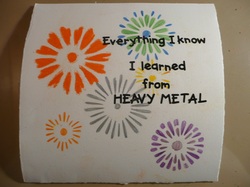 I have been dating a lot lately. I mean A LOT. What an adventure. I have been meeting really great people, having fun, and learning astonishing things about myself. One of the young men I have been dating told me that there are some ways that I am different than other women, differences that he appreciates immensely. So I thought I might lay some knowledge down so that other people might benefit from the fruits of my, um.....labors. I am going to tell you up front, my advice will enter meekly and exit with a thunderclap, so if you are not up for some straight-up talk about sex and dating, just don't read this. I really don't want to offend anyone.
So, there you have it. Eight things I know about sex. They will be appearing in my upcoming book, Date Like a Badass. It is going to be epic. Did you like this? TWEET IT! LIKE IT! SHARE IT!!! *Editors note: AIDS does not kill. HIV is not the same as AIDS and you can live a long life on ARVs. (Antiretroviral drug). It is still not worth taking the chance. Wrap it up.
12 Comments
 Several years ago, I did a project called 20 Dates in 20 Weekends: A Craigslist Dating Experiment. It was an epic adventure where I took 20 random dates from Craigslist and turned them into comedy gold. Well, okay, maybe not exactly, but in retrospect, it was funny. At the time it felt grueling and slightly uncomfortable. Anyway, I went out with people I would normally never consider going out with, and focused on being present during the dates; asking questions, trying to figure out what made these men tick. Most of the time, I was surprised. I ended up learning a lot about myself the more I listened to and understood the people I went out with. It was a real turning point in my development as a human. Of the many things that I learned, the lesson that has helped me the most is that when I let go of my expectations, I have way more fun. I was never looking for any of these men to fill any of my specific needs, desires, or gaping chasms in my emotional life, I was just hoping to have something interesting to write about at the end of the night. This approach kept me open to appreciating who they were. People are really very entertaining if you let them be. I call it expiration dating. When you go out with a person without any pre-conceived notions of a long-term commitment, you end up having way more fun because there is no pressure to turn it into something. You are free to enjoy because you have no stake in making it last. You can be yourself, and you don't have to ask them any leading questions or figure out whether or not they will be a good long-term earner. In the end, you really just need to prepare to meet someone who could be interesting, or, best of all, challenging. I love a good challenge. Just yesterday I was speaking to a friend of mine and he told me that he and his lovely wife of fifteen? sixteen? years were initially expiration daters. He said that in effect, it allowed them to just be themselves, no pretense, no bullshit. Don't get me wrong, I am not telling you to use this strategy to hook someone into a long-term relationship. I am not a fan of LTRs, nor would I ever suggest that anyone use any particular strategy in order to get one. I am simply saying that when you let go of control and expectations, your dating experience is more enjoyable, no matter where it leads you. I talk to a lot of people about dating and they seem to loathe it. They tend to see relationships as something that will spare them from an incredibly unpleasant and horrible series of events. This is too bad and violates one of my biggest rules in dating and in life. Do not look for rescue from your present horror. The choice you make is very often made in desperation and in many cases will produce an out-of-the-frying-pan-and-into-the-fire-type effect. How many times have I seen people make bad choices in love simply because their singledom/dating life was less than fulfilling? Too many to recount, and I bet if you thought for a minute, you might realize that you know someone in this very situation. Unpleasant experiences are opportunities to turn something bad into something truly great. Once that thing, event, experience is something we love, we are bound to make better choices for ourselves. Having a life that consists of choosing the lesser of two evils is a depressing way to live. All you need to do is look to the US political system to know that. This is my challenge to you on this Friday morning. If you happen to find yourself single, go out with someone this weekend who you are not really interested in, someone who you might not typically date. Find out what their world view is all about. Prepare to be entertained. Set your focus to "razor sharp" and be curious. Put your expectations, your needs, desires and desperation aside, and you just might have a lot of fun. You might laugh. You might learn a little about yourself. If you take this challenge, leave your results in the comments section below. Or, if you need to work up to this challenge, let me know how it goes when you can manage it. Did you like this post? Tweet it! Like it! Share it with a buddy!
 In the fourth and final part of this management series, I am finally going to get to how truly epic it is for you and everyone around you when you are rockin' a management position. First, I will go through the obvious benefits which come with being a good manager, which need no explanation, then I will dive deeper.
This is the secret that every good manager knows. Yeah, it is hard work, it will challenge you, it will push you to your limits at times, but it will also bring you great joy and satisfaction knowing that your employees are well served by you. Yes, a good manager understands that he is of service to his employees. He checks in with them regularly, asks them what they are workin' on, if they have everything they need to do their job well, and listens to their responses. He develops strong professional relationships with his employees because he knows that he will benefit from the trust that will develop. Trust is a requirement for a manager to foster because with trust in an organization, people are happier and everything moves faster.
The person you should start with, as always, is yourself. If you don't trust yourself to be a manager of people, then you need to get help, because management positions have broken many a strong woman with ease, and it will break you too, if you do not trust in your skills and abilities. Get help when you need it, and most importantly, get a mentor who is good at managing her people. It will pay off in ways you could never predict for the rest of your life. I knew a woman who was the manager of an accounting department at a place that I worked. She demanded a lot from her people, but she also tended to be defensive and a bit aggressive toward her staff and her colleagues. One day, as I was waiting outside my supervisor's office for a meeting, I overheard this manager and my supervisor talking about me in less than colorful terms. This woman was telling my supervisor that unfortunately, I did not know how to do specific parts of my job, and that is why parts of her job were not getting done. My fantasy was to go in there with all the might and power of Heavy Metal, tell them both where to go, and reveal this woman for the fraud that she was, sword in hand, wind blowing back my hair as Dio's Holy Diver played in the background. (I have a rich fantasy life which sometimes fuels visions of bad 80s Heavy Metal videos) But I did not. I sat there quietly, patiently, and listened to every word she said, and reflected on whether or not it was true. To my great relief, not much of it was, but it gave me an insight into her treatment of the people on her staff and the people that she worked with. She had no confidence in her abilities and she was worried that her boss, her employees and her colleagues would find out that she was a fraud. Instead of asking for help with the skills she needed to develop, she was pushing everyone away with her behavior and ridiculously complicated accounting techniques. What a lot of energy she spent. She was an unhappy person because she could not trust herself. Her staff was deeply unsatisfied and a bit nervous, because they knew that she would fire them if they appeared to know her weakness. It was a broken situation which never healed until she left the job and was replaced by someone who had the skills and abilities necessary to do it. Get the skills you need to do your job. Take communication training and any other training necessary to be an asset to your employees. If they need help with something that is not your strong suit, get them the help they need from someone who is capable. Be open about it, from your weaknesses to what you are doing about them. Your employees will respect you for it. When you trust yourself, it is easier for you trust your employees to do their jobs. You are also open to hearing their criticism of you. What? You don't want criticism? They have no right? You are the boss? Get over yourself. It is no longer the 1950s. It is the new millennium, and we must accept that even though we are someone's boss, we are no better than they are as a human, and holding on to this false belief will only weaken your position. Ask for criticism. Let them know that you need their feedback in order to do your job better, that you depend on their honest evaluation of how you do your job. Asking for this communicates that you respect your employees, that you trust them, and that you depend on them. It lets them know that they are important to you. Do you know what people do who feel respected and trusted? They work their asses off for you. They do their very best. You will have a work culture which values hard work, integrity and trust. When new employees come into this culture, they will need less from you because in order to fit in and thrive, they will need to develop these qualities. This type of culture also includes healthy professional boundaries. More of your time is spent on work, and less of it on non-work. Over time, less and less of your time will be spent managing, and more of it will be spent cheerleading and directing. If you are a manager, you need time to do long-term planning, and you will have that time if you foster an atmosphere of trust and respect. You will be able to celebrate your successes with your employees, giving them the credit they deserve, and watching them develop their own skills and abilities in order to fulfill their career goals. You will be a part of the success of others! You will have the deep satisfaction of knowing that you helped other people be their best! At this point, it is all about growth. If your employees are interested in growing, your job is to help them get to the next level, if there is one to be had. Yes, being a manager is a lot like being a parent. You need to give your employees wings so that they can use them if they need to. It is your job to help them be better, and there is no greater joy than watching someone you managed work their way up or into their dream career. Still better is when they tell you that you were pivotal in helping them get there. Not only have you done your job well, you have helped your employees achieve their dreams. What a rewarding relationship this can be! As a good manager, you are fueling the happiness of your employees and their families. You are encouraging them to take on the world with confidence, and, you are also teaching them how to be a good manager to their employees one day. Being a manager can be a dream job if you put the effort and energy into yourself and your people. If you are lucky enough to be made a manager, don't miss out on that opportunity. Did you find this valuable? Entertaining? Awesome? LIKE it! TWEET it! Email the link to your buddies!!!! Share the heck out of it, and people will thank you, as will I.  This is about my journey into badassery. If you can get there by other means, I encourage it. It is a lot of work. Vigilance is necessary if you are going to create and maintain boundaries for healthy living. As soon as you set some, you will be tested. The universe will want to know if you are serious about these boundaries you have put in place for yourself. It is painful. Not all the time, but in order to get to a place where you can be courageous, confident, compassionate and calm, you have to go through some shit. You have to look at yourself in a way that can reveal weakness. You have to be honest about your behavior, about your attitude, about how you treat yourself and others. It doesn't seem to end. You will learn the same lessons over and over again, until you become an expert. I have worked out a lot in my 44 years, but just recently, it came to me once again that I am not asking for what I need. I really believed down to the thick rubber soles of my boots that I had learned this lesson several times. Unfortunately it turns out that I had not. Not enough, anyway. I began learning this lesson roughly 35 years ago. When I was nine, my father told me on Christmas day that I was acting like a bitch. The details of this story are unimportant, except for the one that matters: he was right. I was deeply unhappy and feeling crazy about my parents divorce. I felt like I was losing them both. My face was already breaking out, I was mean much of the time, and I lied and acted out regularly. The next day I decided I would change one thing. I would try to stop lying. Given the fact that I was nine, and trying to work on myself in an insane situation, you can imagine how well that went. But I tried. I lived through my teen years along with most of my friends in an alcoholic stupor. I barely made it out of high school, and when I tried to go to college, my efforts were half-hearted at best. Then a miracle occurred. I started having horrible gut-wrenching pains every time I ate. At the age of 21, I could barely digest food anymore. After years of drinking alcohol and eating fried and overly-processed foods, my body decided to stop. My Naturopath told me I could choose one of three things: dietary changes, drugs, or surgery. Being a poor student and not having a good track record with drugs or surgery, I opted for dietary changes. I started eating Macrobiotically. The reason I call that severe digestive problem a miracle, and why I have learned so much from it, is that I had a choice. I could engage in feeding myself, or, I could choose between two options that would ultimately take the control out of my hands and put it into the hands of others. This was a big turning point for me. Macrobiotics is a simple way to eat; it consists mostly of vegetable protein, vegetables, whole grains, nuts and seeds, and fermented foods. Unfortunately, while it is simple, it is also a huge task to undertake. For every meal you eat, there is at least an hour and a half of preparation involved. You have to eat in a certain order. You have to cut your food in specific ways. I spent a year doing that, and in the end my body worked reasonably well and I felt great. Better than I had since I was about three. I figured, problem solved, check that right off my list. I wish I had been right about that. Over the course of my life, I have taken the opportunity to abuse my body in some way for long periods of time several times. Each time, it came from not listening to, or rather, blocking out what my body was telling me. There have been small, quiet warnings that I have noted and heeded, as well as times when I needed a kick in the ass and a punch in the gut as I was falling down the stairs to wake me to what I was doing to myself. There is one common denominator that ties every one of these painful experiences together. The level of engagement in my life. That is it. It sounds simple, but when your life is painful, it is the most significant and terrifying thing you will ever do. Engagement. Engagement means turning off the TV. It means putting the credit card away. It means putting down the bottle. It means putting the ice cream back in the freezer. It means focusing inward on what you are feeling. It is scary. It is powerful. It is challenging. But, it is the thing that ultimately frees you. Since making a commitment to myself to engage in my life, I have never been happier. In fact, there are times that I am so happy that I find it hard to believe. I learn lessons over and over, and eventually, I will have new lessons. And I am free. I am free from blame, I am free from fear, and I am free from doubt on most days. Engaging in my life is very hard work, but I have never done anything that has paid such high dividends. I am confident, and my confidence comes from knowing that I can handle it, not from being perfect or in perfect harmony all the time. I have come to enjoy this engagement. I learn about myself constantly, and in so doing, am open to learning about others. It is a more amazing life than I could have imagined. Is this awesome to you? Like it! Tweet it! Share it with a friend!!  This image was found at deathstarpr.com. This image was found at deathstarpr.com. This is part three of a series of four posts covering the conundrum of The Crappy Manager. Throughout the series, I have used Darth Vader as a visual reference because he is unapologetic and crappy, and no one is as bad as he is at managing people...or clones. What I am saying is, even if you are feeling sad about being crappy, remember; even Darth Vader turned it around at the very end, so you can too. Let's start with your acceptance that you are either a little crappy or completely crappy. You realize that you have most likely lost accountability with your staff, maybe even with your supervisor, and feel like you are in a hole so deep you might never dig your way out. Have no fear. Every epic journey taken begins with one small step. This one is no different. Before we get to the changing part, I should probably outline some basic qualities of a good manager so you know what ballpark you are going to be playing in. This will help you going forward with developing your own personal management style.
Clearly, these are generalities because to get any more detailed, I would need to know industry, number of employees, how many people a specific manager supervises, etc. So let's just go with this general outline of these eight rules. I call them The Magic Eight. I am not presently a manager, but I am in the midst of consulting several. An essential truth is that it is rarely important what industry you are in. Managing comes down to relationships. My management style is very direct. Frankly, for a lot of people, maybe a little too direct, but I rely upon my people to let me know when I am stepping over the line. That is the other great thing about being a manager. If you can accurately assess yourself, you can hire people who will compliment your skills beautifully. For instance, at a management job that I held in Portland several years back I was able to hire two people to compliment me in different ways: Employee number one, we'll call him Frank, had over fifteen years experience in a position very similar to the one that he was applying for. He knew the job inside and out, and I had no doubt that he had the skill set that I was looking for. There are two big reasons I hired Frank, and they both pertained directly to my own weaknesses.
Employee number two, we'll call her Mary, had over five years experience in the position she was applying for. She was incredibly well groomed, carried herself well, and was very proper. The job she was applying for was high-stress but social. There was one reason I hired Mary. Her sweetness. It came through in the interview, and I knew that her temperament would balance my, well, my propensity to be a bit harsh. I can vividly recall going to a meeting one day and hearing her call after me, "remember to be nice!" It was a wonderful way to go to a meeting, as well as a nice reminder, of which I was sorely in need. So, there you go. I benefited from understanding my weaknesses because it put me in a position to address them in a constructive manner. Being a manager is not a destination, it is a process that you must constantly work on. There will always be challenges and opportunities. Most often it is a change in mindset that has to happen in order for you to truly manage like a badass. Here are five things I would start with. They take time, so make sure and allow for as much time as you need to work on them. Your whole life would be a good place to start. One thing you might want to do before you begin working on improving is to recognize whether or not you even want to manage people. If you are not interested in having hard conversations with people about accountability, management is most likely not for you. If you feel like you do not have it in you to be honest about your failures to your staff and be responsible for improving, management is most likely not for you. It is very important to recognize whether or not you are manager material. Not everyone is, and that is okay. It is just time for you to move on to another profession. Make plans and do so. You will be so much happier if you choose to take care of yourself in this way. Second, take a good look at your strengths and abilities. Make a list of what you do well and what you do not do well. Divide that list into things you can learn and things you can delegate. This is a huge part of management. As illustrated above, your employees are your teachers as much as you are theirs. Learn from them. Use them to make you better. They are your resource as much as you are theirs. Next, find out what each employee needs from you. This conversation is best completed on an individual basis. This will be tough because it could lead to a bit of venting about your past failures. Do not to take it personally. This information is gold because it will help you grow as a manager and a person. Listen with an ear toward improvement, and stay out of the victim mindset. Your employees might need to vent. It is best to let them. Do not get defensive, do not argue. After they let off steam, ask them what it is they need from you. That is the sweet spot. If it is doable, make an action plan with a schedule for feedback and completion. Make sure to thank them for trusting you with the information they have provided. It takes courage to be honest with your boss about what you need, it is a risk that should be rewarded with authentic gratitude. Number four, I suggest that you get to know each of your employee's strengths and weaknesses. While doing so, make sure to emphasize that weaknesses are not a bad thing, they are just an item to keep in mind when creating a team, much like strengths. Find out if they would like to improve their weaknesses or if they would rather learn a new skill. (Sometimes it is not worth it to improve on a person's weakness as it is due to disinterest.) Match employees up with people within your department and even in other departments if possible so that they can work together in complimentary ways and even learn from each other. Number five, find a manager who is good at managing and develop a professional relationship with that person. Do this by offering help to them in some manner, offer them a free lunch or cup of coffee, anything that can give you an opportunity to talk with them about management style. It is usually best if this is not your boss, unless you have the kind of relationship that enables you to be completely honest with him about your management style. It is always good to get advice from someone who is less invested in your success, so that the advice is not emotional in nature. That is it. I go much deeper into these suggestions in my upcoming book, Work like a Badass. In that book, I give step-by-step instructions for how to handle these types of interactions. The reality is that this type of thing takes practice and a bit of training. Requesting training on this type of communication will serve you no matter where you are in your career. Stay tuned next Friday for the fourth and final installment of this management series. It will illustrate how great it is to be a manager and all of the ways your whole life can improve if you do it right. Did you like this? LIKE it! TWEET it!!! EMAIL it to a friend!!! OR, simply leave me a happy comment below.  "We live at the edge of Miraculous." ~Henry Miller I could have put any picture up there. I could have posted a picture of a sidewalk, a vending machine, or a small tree. The truth is that objects are not miraculous. We are. We are all of us miraculous, but until we can see it in ourselves, we will not see it in the world around us.
I have been listening to a lot of young people lately. They are all looking for meaning. Many of them want meaningful careers, meaningful lives. While I understand this sentiment, I also know from experience that like any work of art, any piece of music or any book, the meaning does not come from the work alone, it comes when a participant truly engages. An artist's work is made through the filter of love. In order to express any idea fully, the artist must understand it enough to love it, and through the work, love it enough to release it. You can listen to music in the background, or you can really listen. Block out all distractions, sit, and listen. You can look at a piece of art in a museum, walk by it and glance in its direction on your way down the gallery, or you can stand in front of it and really take it in. You can look for a job that will bring meaning to your life, or you can bring meaning to your job. Ultimately, if you do the latter, you can also take it with you when you leave. The world will be a more miraculous place once you put yourself into it. What are you waiting for? Did you like this? Find it inspiring? Like it! Tweet it! Share it with a friend!!!!  Last week, I gave you some tips for how to handle a crappy manager. This week, I am going to go over how to tell if you are a crappy manager. One of life's cruel jokes is that we are not often aware of the pain we are causing others. Many people I know who are managers are not good at it, but for some reason are unaware. If you find that you fall into the category, don't worry, we have all been there, and while I can't tell you that it is easy to fix, I can tell you that with effort and focus, anything is fixable. First, an explanation as to why there are so many bad managers in the world, despite the ginormous number of books there are on leadership. (Over 21 thousand listed on Amazon as of this post.)Most managers are people, who, for one reason or another, were very good at the jobs they had before they were promoted to a management position. At some point, a manager was needed. The higher ups figured, "hey, that lady is good at her job. She is responsible. She is diligent. Let's make her the new manager!" So, there she is, all excited about her new position, she is learning the job and figuring out the spreadsheets, the accounting software, the vendor information, where to send what forms and what all the deadlines are. She is doing well learning the skills part of her job, except for one small detail: management, the actual handling of people. Directing, coaching, leading; these things have not even been broached. She has not been taught the exact science or subtle art of communication. Communication training, more than any other, could guarantee her success as a manager. Most likely, she will not receive any. She might not even be aware that she needs it, or, if she is, she is too insecure about her job to ask for it. This set-up is very common. This is how you create abusive managers. You put new managers into a situation where they do not have the skills to do the job, they become insecure because they know they are not good at it, they are too afraid to ask for help because of their insecurity, and they end up making their employees miserable because of it. I, myself have been promoted to management positions on several occasions in different industries without any type of communication or personnel training. It is usually quite a mess. Here are all the reasons why it doesn't work out:
Here is a little quiz I use in order to keep myself on track as a manager. I make sure that I am able to answer yes to all of these questions. How many can you answer yes to?
My guideline is that if I cannot answer yes to all of these, I am not doing what I should as a manager. If I am answering "no" to more than four, I am crap. I have to work on improving so that I can be an asset to my employees. If you take this quiz, be as honest as you can be. These are all things you should be doing for your employees on a regular basis. As a manager of people, it is your job to supply the tools and support that your employees need in order to ensure their success. Most managers think that their employees are there to serve them, when, in reality, it is the manager's job to serve their employees. It is also an absolute that any manager who has achieved any level of true success has done so through proper employee management and mentoring. As a manager, your success depends on the success of your employees. If you are not treating them as such, your organization/company/department will struggle. Did you find this useful? Do you have feedback? Comment!! Did you like it? Tweet it or Like it or email the link to a friend!! |
A Love Rebellion.
Be a part of A Love Rebellion. Spread love, hope and compassion.

Artist WebsiteOnly the highlights from my creative life. Just click on the image.
Most Popular
My work is supported by my readers. If you feel like you get something out of this every week, and you feel you are able, a $3 to $15 monthly subscription will help me bring you all the ass-kicking content possible. Thanks so much for your support.
Archives
June 2019
|


 RSS Feed
RSS Feed
